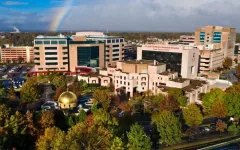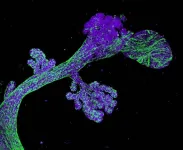(Press-News.org) Many cancers, including some types of breast cancer, are driven by alterations in the activity of cellular enzymes called kinases. Therapies that directly inhibit these cancer-promoting activities have proven to be effective for patients in which individual driving kinases can be diagnosed.
One major challenge to this therapeutic approach is to accurately quantify tumor kinases in human biopsy samples. Many kinases are not abundantly present and are therefore more difficult to measure accurately. Although currently there are methods to quantify small amounts of kinases, measuring multiple kinases concurrently is cumbersome and impractical in a clinical setting where rapid data return is critical. It is crucial to develop methodologies to enrich kinases present in clinical samples, an important step toward effective personalized medicine.
In a study published in Clinical Proteomics, researchers at Baylor College of Medicine and collaborating institutions report the development of a kinase inhibitor pulldown assay (KiP) that can optimally enrich and quantify the small amounts of kinases present in biopsy samples in combination with mass-spectrometry techniques.
The researchers established the coverage and quantitative fidelity of the assay for kinases in a single-shot approach, optimized a 100-kinase targeted panel and determined the effectiveness of KiP in subtyping breast cancer patient-derived animal models and two breast cancer patient sample cohorts.
"Our study represents a convergence of advanced technologies, redefining basic medical research and paving the way for future clinical applications,” said first author Dr. Alexander Saltzman, senior bioinformatics analyst at the Mass Spectrometry Proteomics Core at Baylor.
“This paper emphasizes that new methods in protein mass spectrometry hold great promise for better definition of the individual druggable landscape present in each cancer and should be more widely used for research and, ultimately, clinical care,” said co-corresponding author Dr. Matthew Ellis, faculty at Baylor’s Lester and Sue Smith Breast Center.
“This methodology’s approach to identifying key kinases in cancer may even extend beyond these enzymes and into other low-abundance and biologically relevant targets,” said co-corresponding author Dr. Beom-Jun Kim, currently an associate director at AstraZeneca and an assistant professor at Baylor at the time of research.
Doug W. Chan, Matthew V. Holt, Junkai Wang, Eric J. Jaehnig, Meenakshi Anurag, Purba Singh and Anna Malovannaya also contributed to this work. The authors are affiliated with Baylor College of Medicine, the Lester and Sue Smith Breast Center and/or the Dan L Duncan Comprehensive Cancer Center.
This work was supported by CPTAC PTRC grant National Cancer Institute’s Specialized Programs of Research Excellence (SPORE) (U01 CA214125) and a CPTAC PGDAC Award (U24 CA210954). Ellis received support from a CPRIT Established Investigator Award (RR140033) and from Ralph and Lisa Eads. Ellis also is a McNair Medical Institute Scholar. The BCM Mass Spectrometry Proteomics Core is supported in part by a Dan L Duncan Comprehensive Cancer Center Award (P30 CA125123), CPRIT Core Facility Awards (RP170005 and RP210227) and an NIH High-End Instrumentation Award (S10 OD026804).
###
END
Method improves detection of potential therapeutic tumor targets in human biopsies
2024-01-16
ELSE PRESS RELEASES FROM THIS DATE:
Canadian Science Publishing goes live on OA switchboard
2024-01-16
As part of our open science strategy, Canadian Science Publishing (CSP) is pleased to announce our new partnership with OA Switchboard, a mission-driven, community led initiative designed to simplify the sharing of information between stakeholders about open access publications throughout the whole publication journey.
“We’re thrilled to partner with the OA Switchboard to improve the visibility of the work we publish,” says Elaine Stott, Chief Executive Officer of CSP. “This initiative enables institutions, consortia and funders to report ...
A new, rigorous assessment of OpenET accuracy for supporting satellite-based water management
2024-01-16
Sustainable water management is an increasing concern in arid regions around the world, and scientists and regulators are turning to remote sensing tools like OpenET to help track and manage water resources. OpenET uses publicly available data produced by NASA and USGS Landsat and other satellite systems to calculate evapotranspiration (ET), or the amount of water lost to the atmosphere through soil evaporation and plant transpiration, at the level of individual fields. This tool has the potential to revolutionize water management, allowing for field-scale ...
Multisite clinical trial will compare three FDA-approved drugs for Rett syndrome treatment
2024-01-16
Vanderbilt University Medical Center received a $13 million Department of Defense grant to lead a multisite clinical trial that will evaluate repurposed FDA-approved drugs as treatment options for patients with Rett syndrome.
Affecting 1 in 10,000 females at birth, and males even more rarely, Rett syndrome is a rare genetic neurodevelopmental disorder that affects brain development.
“It robs affected individuals of the ability to use their hands or speak and causes problems with mobility, as well as a number of other issues,” said Jeffrey Neul, Annette Schaffer Eskind Professor, ...
St. Jude Home Care, LLC is first US pediatric home health agency to earn new category of industry certification
2024-01-16
St. Jude Children’s Research Hospital announces today that St. Jude Home Care LLC, a home health agency for the hospital’s patients, earned dual certifications in both pediatrics and home health from Community Health Accreditation Partners (CHAP), an independent, non-profit, accrediting body for home and community-based healthcare organizations. St. Jude Home Care LLC is the nation’s first agency to achieve that distinction. CHAP is the only organization in the U.S. that grants a discrete pediatric certification ...
Study pinpoints breast cancer ‘cells-of-origin’ in high-risk women
2024-01-16
Australian scientists have pinpointed likely ‘cells-of-origin’, the source cells that can grow into breast cancer, in women carrying a faulty BRCA2 gene who are at high risk of developing the disease.
The WEHI-led study also showed these cells have potential to be targeted with an existing cancer drug to delay tumour growth, in findings that may lead to future preventive treatments for the disease.
At a glance
Women with faulty BRCA2 genes are at a substantially higher risk of developing breast ...
Supports help keep Aussie firefighters safe
2024-01-16
House fires, road crashes and emergency rescues – they’re all part of the job for Aussie firefighters. And in such physically demanding roles, maintaining a high level of fitness and movement quality is essential.
Now, new research from health and fitness experts at the University of South Australia shows that professional firefighters have reduced movement quality as they age, which could put them at greater risk of injury.
Conducted by UniSA masters researcher, Alex Redshaw, in partnership with the South Australian Metropolitan Fire Service (MFS), the findings indicate that firefighters over the age of 50 generally have lower movement ...
Study: New deepfake detector designed to be less biased
2024-01-16
BUFFALO, N.Y. — The image spoke for itself.
University at Buffalo computer scientist and deepfake expert Siwei Lyu created a photo collage out of the hundreds of faces that his detection algorithms had incorrectly classified as fake — and the new composition clearly had a predominantly darker skin tone.
“A detection algorithm’s accuracy should be statistically independent from factors like race,” Lyu says, “but obviously many existing algorithms, including our own, inherit a bias.”
Lyu, PhD, co-director of the UB Center for Information Integrity, and his team have now developed what they believe are the ...
Researchers find that using patients’ own blood, rather than saline, helps preserve veins in coronary bypass grafts
2024-01-16
In a collaboration between the Fralin Biomedical Research Institute at VTC and Carilion Clinic, researchers learned that by preserving large superficial leg veins intended for coronary bypass grafting in a mixture of the anticoagulant heparin and blood, rather than heparin and saline, the veins were better protected from cell and tissue damage.
Their findings, published in January in the Journal of Vascular Research, could inform surgical practices and enhance the long-term success of vein grafts in coronary bypass surgeries.
“Ultimately, we're putting healthier blood vessels ...
What if cows could talk?
2024-01-16
You may not know it, but cows share information every time they burp, moo, and chew that speaks volumes about their health and welfare.
Through the work of researchers in Virginia Tech’s College of Agriculture and Life Sciences, we may soon know more about what cows are “telling” us and be able to use that information to improve their well-being.
James Chen, an animal data sciences researcher and assistant professor in the School of Animal Sciences is using a $650,000 grant from the U.S. Department ...
Allen Fawcett named Director of the Joint Global Change Research Institute
2024-01-16
By Greg Koller
COLLEGE PARK, Md.— Allen Fawcett — an energy expert and economist who has played a leading role in formulating and coordinating U.S. climate policy — is the new director of the Joint Global Change Research Institute.
Fawcett joined the Environmental Protection Agency in 2003 and, since 2012, served as the chief of EPA’s Climate Economics Branch, which advances the science of climate economics to inform policy. From 2010 to 2011, Fawcett took leave from EPA to serve as the deputy associate director for energy ...





